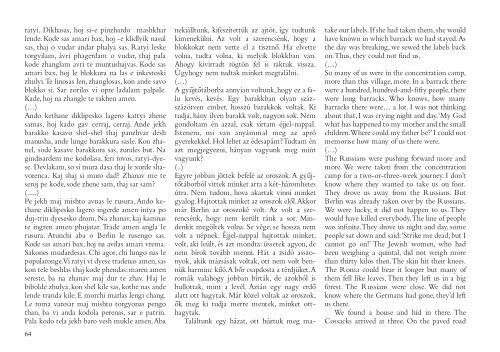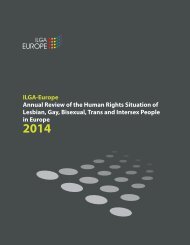Create successful ePaper yourself
Turn your PDF publications into a flip-book with our unique Google optimized e-Paper software.
atyi. Dikhasas, hoj si-e pinzhardo mashkhar<br />
lende. Kode sas amari bax, hoj -e klidlyik nasul<br />
sas, thaj o vudar andar phalya sas. Ratyi leske<br />
torgyilam, ávri phagerdam o vudar, thaj pala<br />
kode zhanglam avri te muntushajvas. Kode sas<br />
amari bax, hoj le blokkura na las e inkestoski<br />
zhulyi. Te linosas len, zhanglosas, kon ande savo<br />
blokko si. Sar zorilas vi opre ladalam palpale.<br />
Kade, hoj na zhangle te rakhen amen.<br />
(…)<br />
Ando kethane diklipesko lagero kattyi zhene<br />
samas, hoj kado gav cerraj, cerraj. Ande jekh<br />
barakko kasavo shel-shel thaj panzhvar desh<br />
manusha, ande lunge barakkura sasle. Kon zha -<br />
nel, sode kasave barakkora sas, zurales but. Na<br />
gindisardem me kodolasa, feri rovos, ratyi-dye -<br />
se. Devlakam, so si mura dasa thaj le xurde shavorenca.<br />
Kaj shaj si muro dad? Zhanav me te<br />
seroj pe kode, sode zhene sam, thaj sar sam?<br />
(.....)<br />
Pe jekh maj mishto avnas le rusura. Ando ke -<br />
thane diklipesko lagero ingerde amen intya po<br />
duj-trin dyesesko drom. Na zhanav, kaj kamnas<br />
te ingren amen phujatar. Trade amen angla le<br />
rusura. Atunchi aba o Berlin le rusengo sas.<br />
Kode sas amari bax, hoj na avilas amari vrema.<br />
Sakones mudardesas. Chi agor, chi lungo nas le<br />
popularonge. Vi ratyi vi dyese tradenas amen, sas<br />
kon tele beshlas thaj kode phendas: maren amen<br />
sereste, ba na zhanav maj dur te zhav. Haj le<br />
bibolde zhulya, kon shel kile sas, kothe nas ande<br />
lende tranda kile. E morchi marlas lengi chang.<br />
Le roma varesar maj mishto tor gyo nas pengo<br />
than, ba vi anda kodola perenas, sar e patrin.<br />
Pala kodo tela jekh baro vesh muk le amen. Aba<br />
64<br />
nekiálltunk, kifeszítettük az aj tót, így tudtunk<br />
kimenekülni. Az volt a szeren csénk, hogy a<br />
blokkokat nem vette el a tisztnô. Ha elvette<br />
volna, tudta volna, ki melyik blokk ban van.<br />
Ahogy kivirradt rögtön fel is raktuk vissza.<br />
Úgyhogy nem tudtak minket megtalálni.<br />
(…)<br />
A gyûjtôtáborba annyian voltunk, hogy ez a fa -<br />
lu kevés, kevés. Egy barakkban olyan százszázötven<br />
ember, hosszú barakkok voltak. Ki<br />
tudja, hány ilyen barakk volt, nagyon sok. Nem<br />
gondoltam én azzal, csak sírtam éjjel-nappal.<br />
Istenem, mi van anyámmal meg az apró<br />
gyerekekkel. Hol lehet az édesapám? Tudtam én<br />
azt megjegyezni, hányan vagyunk meg mint<br />
vagyunk?<br />
(..)<br />
Egyre jobban jöttek befelé az oroszok. A gyûj -<br />
tôtáborból vittek minket arra a két-háromhe tes<br />
útra. Nem tudom, hova akartak vinni minket<br />
gyalog. Hajtottak minket az oroszok elôl. Akkor<br />
már Berlin az oroszoké volt. Az volt a sze -<br />
rencsénk, hogy nem került ránk a sor. Min -<br />
denkit megöltek volna. Se vége, se hossza nem<br />
volt a népnek. Éjjel-nappal hajtottak minket,<br />
volt, aki leült, és azt mondta: üssetek agyon, de<br />
nem bírok tovább menni. Hát a zsidó asszo -<br />
nyok, akik mázsásak voltak, ott nem volt bennük<br />
harminc kiló. A bôr csapdosta a térdjüket. A<br />
romák valahogy jobban bírták, de azokból is<br />
hullottak, mint a levél. Aztán egy nagy erdô<br />
alatt ott hagytak. Már közel voltak az oroszok,<br />
ôk meg ki tudja merre mentek, minket ott -<br />
hagytak.<br />
Találtunk egy házat, ott húztuk meg ma -<br />
take our labels. If she had taken them, she would<br />
have known in which barrack we had stayed. As<br />
the day was breaking, we sewed the labels back<br />
on. Thus, they could not find us.<br />
(…)<br />
So many of us were in the concentration camp,<br />
more than this village, more. In a barrack there<br />
were a hundred, hundred-and-fifty people, there<br />
were long barracks. Who knows, how many<br />
barracks there were… a lot. I was not thinking<br />
about that, I was crying night and day. ‘My God<br />
what has happened to my mother and the small<br />
children. Where could my father be?’ I could not<br />
memorise how many of us there were.<br />
(…)<br />
The Russians were pushing forward more and<br />
more. We were taken from the concentration<br />
camp for a two-or-three-week journey. I don’t<br />
know where they wanted to take us on foot.<br />
They drove us away from the Russians. But<br />
Berlin was already taken over by the Russians.<br />
We were lucky, it did not happen to us. They<br />
would have killed everybody. The line of people<br />
was infinite. They drove us night and day, some<br />
people sat down and said: ‘Strike me dead, but I<br />
cannot go on!’ The Jewish women, who had<br />
been weighing a quintal, did not weigh more<br />
than thirty kilos then. The skin hit their knees.<br />
The Roma could bear it longer but many of<br />
them fell like leaves. Then they left us in a big<br />
forest. The Russians were close. We did not<br />
know where the Germans had gone, they’d left<br />
us there.<br />
We found a house and hid in there. The<br />
Cossacks arrived at three. On the paved road



